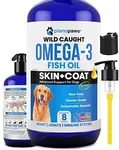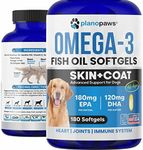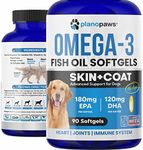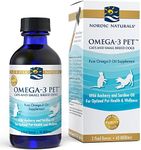Buying Guide for the Best Omega 3 For Dogs
Choosing the right omega-3 supplement for your dog can make a big difference in their overall health, supporting things like skin, coat, joints, and even heart and brain function. Since not all omega-3 products are the same, it's important to understand what to look for so you can pick the best fit for your dog's specific needs. By focusing on a few key factors, you can ensure your dog gets the most benefit from their supplement.Source of Omega-3Omega-3 for dogs can come from different sources, such as fish oil (like salmon or sardine), krill oil, or plant-based oils (like flaxseed). The source matters because fish and krill oils contain EPA and DHA, which are the most beneficial types of omega-3 for dogs, while plant-based oils mostly provide ALA, which dogs convert less efficiently. If your dog needs support for skin, coat, or joints, fish or krill oil is usually more effective. If you prefer a plant-based option, be aware that the benefits may be milder.
EPA and DHA ContentEPA (eicosapentaenoic acid) and DHA (docosahexaenoic acid) are the two main types of omega-3 fatty acids that provide health benefits for dogs. The amount of EPA and DHA is usually listed on the product label. Higher amounts are generally better for dogs with specific health needs, like joint or skin issues, while lower amounts may be enough for general wellness. Check the label and choose a product with clear EPA and DHA amounts that match your dog's needs.
Form of SupplementOmega-3 supplements for dogs come in different forms, such as liquid, softgel capsules, or chews. Liquids can be mixed with food and are easy to adjust for different dog sizes, but some dogs may not like the taste. Capsules are mess-free but may be harder to give to picky dogs. Chews are convenient and often flavored, making them a good choice for dogs who resist pills. Think about your dog's preferences and how easy it will be to give them the supplement regularly.
Purity and QualitySince omega-3 oils can be affected by contaminants like heavy metals or spoilage, it's important to choose a product that is purified and tested for quality. Look for supplements that mention third-party testing, molecular distillation, or certifications for purity. This helps ensure your dog is getting a safe and effective product, especially if they will be taking it long-term.
Additives and FlavoringsSome omega-3 supplements include extra ingredients like flavorings, preservatives, or vitamins. While flavorings can make the supplement more appealing to your dog, it's best to avoid unnecessary additives, especially if your dog has allergies or sensitivities. Check the ingredient list and choose a product with simple, recognizable ingredients that suit your dog's dietary needs.

















